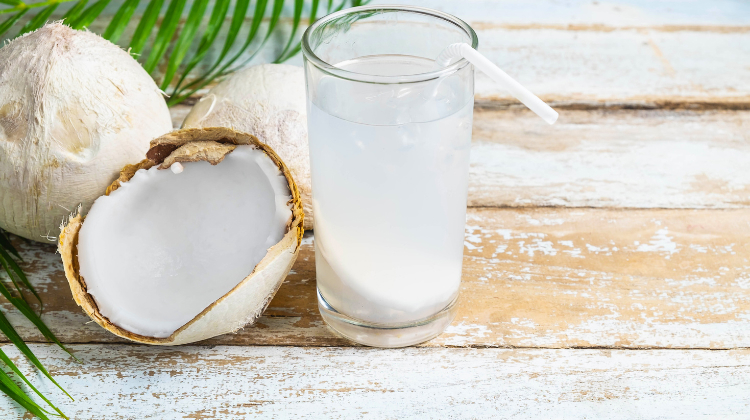Is Coconut Water Good for Pregnant Women? Benefits & Safety 2024

Coconut water, once a trendy beverage in a tropical setting, now attracts fans worldwide. Coconut water is primarily water from immature or tender green coconuts, and it is quite different from coconut-flavored or other tropical fruit drinks. It’s also not coconut juice with added sweeteners or coconut milk. Be sure to read labels carefully to understand what you buy and drink.
Pregnant women spend a lot of time and energy researching what they put into their bodies. This is especially true if you are pregnant and dealing with other issues as well, like nausea or high blood pressure.
Rightfully so, you want to consume beneficial food and drinks not only for your own nutrition but for the health and wellbeing of your future child. Therefore, when considering a dietary change or trying something new, be sure to consult with your doctor. So, is coconut water good for pregnant women?
Is It Safe to Drink Coconut Water While Pregnant?
Consuming coconut water is refreshing on a warm day and can taste vaguely sweet at the same time. It also contains some helpful vitamins and minerals. So, is coconut water good for pregnant women? When you consider options to hydrate yourself through your pregnancy, you want to pick safe drinks that add only good things to your diet.
Every pregnant woman is different. You have your own unique medical background, history, and conditions. You also possess individual tastes, likes, and dislikes. Perhaps the idea of flavored water sounds good to you, or you’ve tried fresh coconut water and enjoyed it. Either way, now that you’re expecting a baby, you find yourself researching to learn if it’s safe to drink.
Yes, overall, coconut water is safe for consumption when pregnant. No doubt, the best way to hydrate yourself is to drink water. Many doctors recommend drinking eight to ten glasses of water per day. However, if you’d like to add some variety and taste to that water without added sugar or salt, coconut water can be a great choice.
Coconut water adds essential nutrients and fiber, without saturated fats[1], that can benefit an expectant mother. But, as always, moderation is key. You don’t want to drink or consume too much of almost anything during pregnancy. Therefore, avoid drinking too much coconut water not only during pregnancy but also during breastfeeding. Keep it between one to two cups a day.
Health Benefits of Coconut Water During Pregnancy
Provides Hydration
A common complaint during pregnancy is morning sickness. These feelings of nausea in the morning, or any time of day, can sometimes lead to vomiting. When this happens, or you experience another common ailment like diarrhea, your body gets dehydrated[2].
As a result, you’ll need to drink plenty of water or other liquids to replace lost electrolytes and fluids. This is especially important when pregnant, as your baby needs this rehydration as well.
Coconut water contains all of the essential electrolytes you and your baby require. This includes important minerals as well as phosphorus, sodium, potassium, and calcium. The combination makes you feel hydrated, which leads to a more comfortable and less tired state of being. Electrolytes are an essential part of your physiology, making possible everything from thought to muscular contraction and other processes.
After a workout, if you drink coconut water, you’ll also feel more centered since the subsequent hydration helps support healthy pH levels in your body and better regulates blood pressure. Any natural isotonic drink like coconut water[3] works well as an energy drink without caffeine or added sugar. As a result, you’ll feel less thirsty, fatigued, and emotionally or physically exhausted.
Another great benefit is that it’s a natural boost that also keeps your skin hydrated, and this can help prevent more stretch marks around your breasts and belly.
May Lower Blood Pressure Levels
When you’re dehydrated and experiencing a dip in electrolytes, blood pressure can go up in pregnant women. Blood pressure sometimes increases later in pregnancy, naturally or due to pregnancy-related conditions, not to mention the effects of stress as you approach your due date. You could also perhaps be experiencing higher than normal blood pressure for other reasons.
Coconut water can help! It’s filled with lauric acid and good amounts of potassium and magnesium. This combination could help in lowering your blood pressure[4] to a healthier number.
These ingredients may play a role in assisting you with maintaining good cholesterol while driving bad cholesterol down. Studies are underway and, if proven, it will keep your heart healthier during these critical months.
Could Help With Acid Reflux
Among many other changes in your body, let’s not forget hormonal disruptions. Increases in progesterone relax stomach valves and muscles, delaying their normal function. This leads to many uncomfortable conditions that interfere with digestion and can lead to gastrointestinal problems and constipation.
Heartburn is also common as your baby grows, putting pressure on your stomach and intestines. This can worsen acid reflux and generate sour burps from time to time.
The dietary fiber in coconut water can help soothe these types of indigestion issues by easing demands on your intestines and regulating pH levels, neutralizing stomach acids while also working to soften stool.
For some women, this bulking action can ease constipation. When you’re better able to stay regular, it improves metabolism, healthy waste removal, and emotional health all at the same time.
Provides Nutrients to Aid Fetal Development
Adding its many benefits, nutritionists have found that some coconut waters contain compounds that aid in fetal growth as well as biological development. That’s great news for expectant mothers who enjoy a cup of this elixir every day. Coconut water not only quenches their thirst in a sweet and tasty way, but it also helps them stay healthy and support their growing baby[5] at the same time.
You should get enough magnesium, calcium, or potassium in your prenatal vitamins or diet. However, coconut water is a helpful way to supplement and add to what you’re already doing. If you add coconut water to your daily intake, side effects like healthier birth weight and stronger bones for your baby are supported.
May Soothe Morning Sickness
If you find yourself dealing with nausea in the morning or any time of the day, you might want to prevent it from escalating into vomiting. As stated above, vomiting means losing essential fluids, minerals, and other vital nutrients. Some women consume coconut water to feel better and experience less nausea[6].
This is important because so many smells, drinks, and foods can make pregnant women sick to their stomachs, triggering nausea. Finding something that can make you feel less nauseated and less likely to throw up can increase your quality of living during this critical time, both from a quality of life and a hydration standpoint.
It’s nice to feel good while expecting a baby; anything that can help promote that is important. This is especially true during the first trimester when nausea is common, and you’re trying many different solutions.
Helps Counteract Anemia in Pregnancy
Studies have indicated that a woman’s hemoglobin blood count, which naturally dips in pregnancy, can be increased[7] due to coconut water. Blood is important, of course, so this is welcome news.
Side Effects of Coconut Water During Pregnancy
Possible Allergic Reactions
Some products coming from coconuts can cause certain allergic reactions[8] on the skin. This includes products made with coconut diethanolamine and cocamide sulfate. In addition, you can experience irritating rashes from coconut-based makeup, shampoos, lotions, cleansers, and coconut water itself. Stop drinking it and call your doctor immediately if you get a rash.
May Interfere With a C-section
Most doctors will ask you to stop drinking coconut water at least two weeks before a scheduled surgery, and this includes C-sections. This is because it’s believed that coconut water might lower blood pressure. Therefore, coconut water during pregnancy, especially in the third trimester, might not be wise if a C-section is a likelihood.
Raises the Risk of Hyperkalemia
Since fat-free coconut water is believed to contribute to lower blood pressure, it can also make you urinate more frequently. As a result, doctors and other medical professionals suggest pregnant women with lower kidney functions or those suffering from extreme diarrhea avoid coconut water. It’s a fluid thing, and there is an interaction between things like coconut water and blood pressure, kidney function, and hydration.
Avoiding coconut water may also apply to women with low blood pressure, diabetes, or high potassium levels who require medication. Coconut water contains a lot of potassium and can contribute to hyperkalemia[9] (too much potassium in the blood). While asymptomatic at lower levels and unlikely with coconut water via normal consumption, hyperkalemia at high levels can contribute to heart issues, muscle failure, paralysis, or even become life-threatening.
The Bottom Line
Can you drink coconut water while pregnant? Yes, in moderation, coconut water is a great, refreshing drink for pregnant women! It can also contribute to a healthy pregnancy by helping to keep you and your skin hydrated, improve digestion and related tummy issues, increase blood flow, and overall contribute to better emotional health as a result.
Many coconut water accounts touting pregnancy benefits may be anecdotal, but they contain valuable nutrients and taste good, and the science seems to back up the claims. It might also be good to try if you’re experiencing nausea during the first trimester or are just thirsty. Drink a cup or two a day and enjoy!
+ 9 sources
Health Canal avoids using tertiary references. We have strict sourcing guidelines and rely on peer-reviewed studies, academic researches from medical associations and institutions. To ensure the accuracy of articles in Health Canal, you can read more about the editorial process here
- Eyres, L., Eyres, M.F., Chisholm, A. and Brown, R.C. (2016). Coconut oil consumption and cardiovascular risk factors in humans. Nutrition Reviews, [online] 74(4), pp.267–280. doi:10.1093/nutrit/nuw002.
- American Pregnancy Association. (2014). Dehydration During Pregnancy. [online] Available at: https://americanpregnancy.org/womens-health/dehydration-pregnancy/#:~:text=Dehydration%20during%20pregnancy%20can%20lead,nutritional%20support%20for%20your%20baby.
- Mayo Clinic. (2021). Coconut water: Is it super hydrating? [online] Available at: https://www.mayoclinic.org/healthy-lifestyle/nutrition-and-healthy-eating/expert-answers/coconut-water/faq-20207812
- Neighmond, P. (2012). Is The Coconut Water Craze All It’s Cracked Up To Be? [online] NPR.org. Available at: https://www.npr.org/sections/thesalt/2012/06/18/155115477/is-the-coconut-water-craze-all-its-cracked-up-to-be
- John, S. (2016). Coconut Water -Properties, Uses, Nutritional Benefits in Health and Wealth and in Health and Disease: A Review. [online] Academia.edu. Available at: https://www.academia.edu/30536202/Coconut_Water_-Properties_Uses_Nutritional_Benefits_in_Health_and_Wealth_and_in_Health_and_Disease_A_Review
- Tri Ratna Ariestini and Windhu Purnomo (2018). The effect of young coconut water against morning sickness among women in the first trimester of pregnancy. [online] ResearchGate. Available at: https://www.researchgate.net/publication/329474478_The_effect_of_young_coconut_water_against_morning_sickness_among_women_in_the_first_trimester_of_pregnancy
- Arindiah Puspo Windari, Zubaeda, Windatania Mayasari, Syahfitrah Umamity and Fadjriah Ohorella (2022). The Effect of Green Coconut(Cocos Nucifera) Water Consumption on Hemoglobin (Hb) Increase in Pregnant Women in Trimester I And II in the Work Area of Air Salobar Health Center Ambon. CENTRAL ASIAN JOURNAL OF MEDICAL AND NATURAL SCIENCES, [online] 3(1), pp.125–130. Available at: https://cajmns.centralasianstudies.org/index.php/CAJMNS/article/view/572
- Administrator (2020). Coconut allergy – Australasian Society of Clinical Immunology and Allergy (ASCIA). [online] Allergy.org.au. Available at: https://www.allergy.org.au/patients/food-allergy/coconut-allergy
- Devgun, M. (2016). Coconut water drink and the risk of hyperkalaemia in diabetes. Practical Diabetes, [online] 33(3), pp.87–89. doi:10.1002/pdi.2009.



